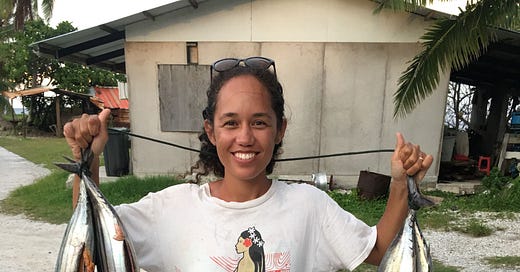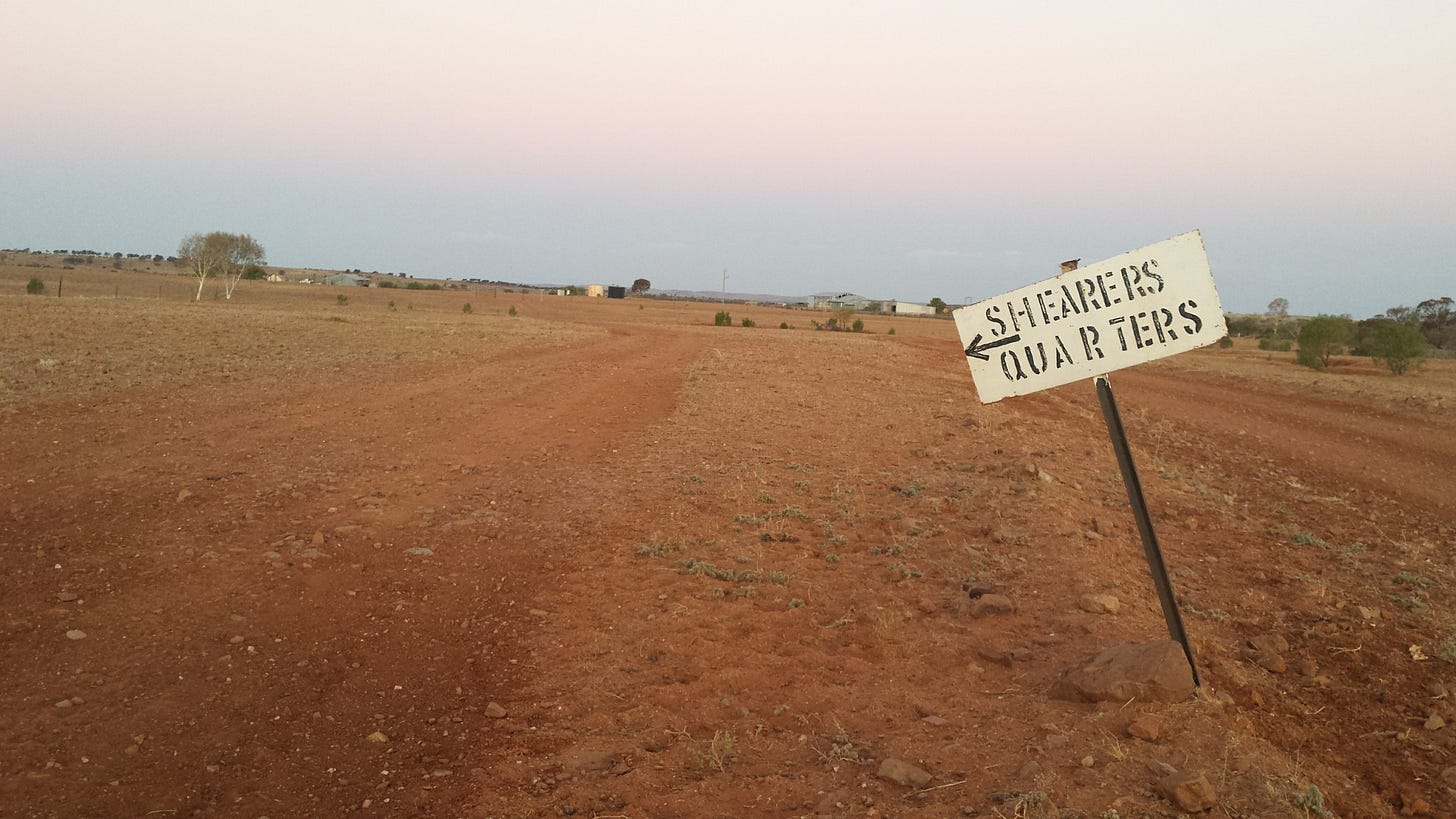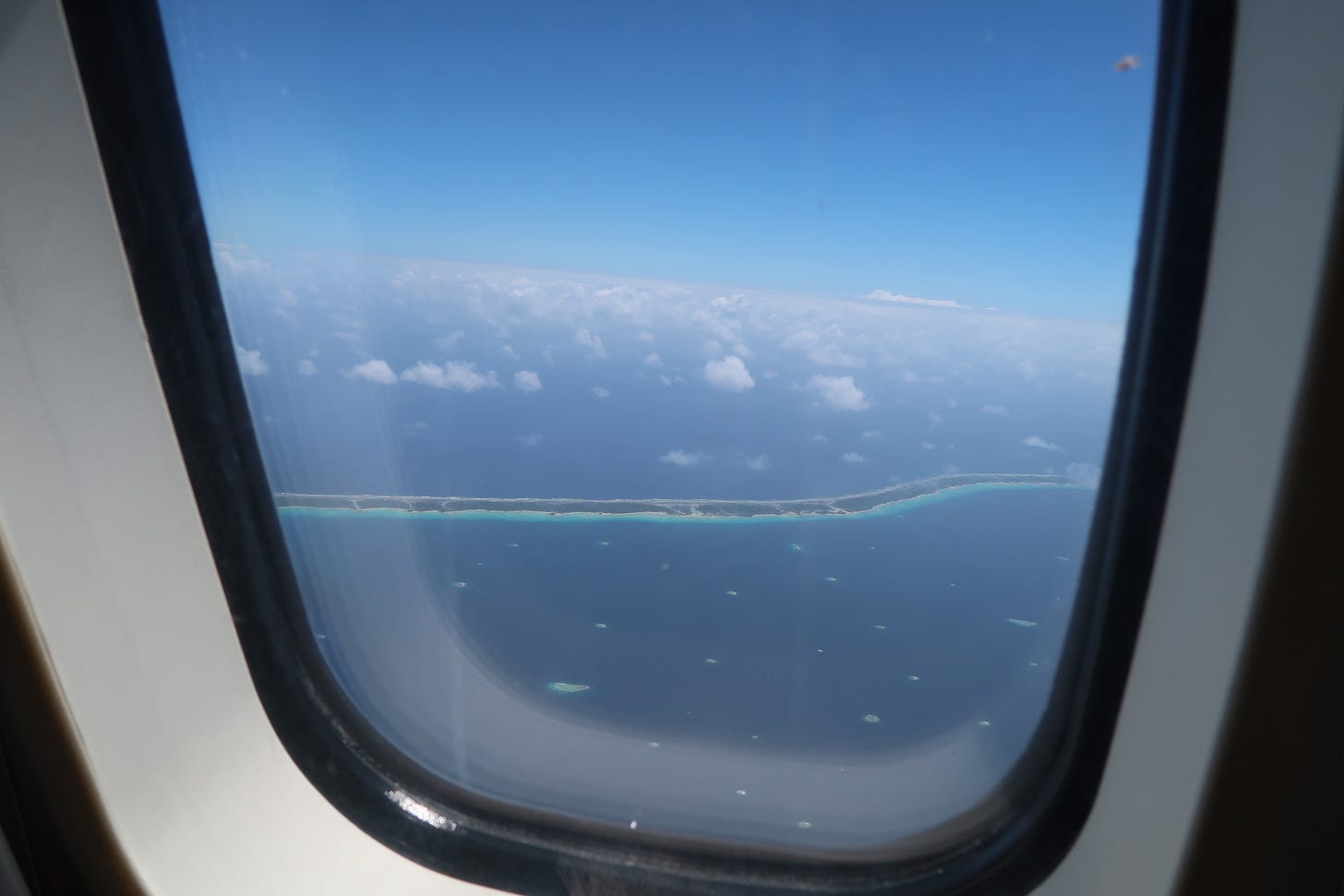Happy Sunday, lovely readers. Those of you who have followed me for some time will be familiar with my love of the remote - whether Fair Isle or Kununurra, if it’s hard to get to I’m probably interested! Today, I’m sharing another guest post written by writer Tiare Tuuhia, on this very theme: living in the remote. I hope you enjoy! Oh - and I’d love to know in the comments. How do you feel about remote places? Yx
Makemo. You probably haven’t heard of it. Neither had I, until I found out I was going to live there. I remember looking it up on google maps and watching the screen become entirely blue. I had to keep clicking the zoom in button until a thin ring of land appeared. That was Makemo. A few months later, I was looking down at the same sight from a plane window, only now it was real and my stomach was churning. The tiny atoll below looked almost swallowed up by the Pacific ocean, both without and within. It was equal parts thrilling and terrifying.
In that moment I was holding my six month old baby in my lap and wondering why I had said ‘yes’ when my husband told me he’d been offered a teaching job in the middle of nowhere. Still, it wasn’t the first time I’d chosen to live very remotely. In my early 20’s I spent a year and a half living in the Australian outback, travelling around to different sheep stations as part of a shearing team. Looking over the Pacific Ocean, the view felt strangely familiar - except that the endless red plains of the desert had been replaced by the sea.
We spent a year living in Makemo and, just like the Outback, it was both harsh and undeniably beautiful. Living in those wild, remote places changed the way I lived, what I valued and how I thought about the world. They shaped who I am today and I like to think they made me a better person.
Less choice = More freedom?
One of the most difficult and liberating parts of living in Makemo was the decrease in available choices when it came to every part of life; what to eat, what to buy, what to do. It all became stripped down, and it was something I struggled with in the beginning. There was only a few small stores on the atoll. Being part of French Polynesia, one of those stores was of course the boulangerie, which pumped out fresh baguettes every morning. The others were like convenience stores; they sold the essentials; flour, oil, sugar, two minute noodles, canned goods and frozen fries. Fresh fruit and vegetables were rare.
Grocery shopping, cooking and meal planning - tasks which I had previously spent a lot of time and energy on - became a lot less work. We ate the same foods regularly and made meals based on availability. Often, my husband would catch fish, or we’d buy fish or be given fish, and that would be dinner for the day. We always had access to fresh coconuts to drink and make coconut milk and we always had rice. We never ordered takeaway because that wasn’t an option.
I had intense cravings and dreamt about eating stuff like Pad Thai and cheeseburgers. But I learned that I could survive without snacks and junk food and I got more creative in the kitchen with the ingredients we had. When usually inaccessible foods became available, they were a huge treat to be savoured. Every now and then a cargo ship would stop in Makemo to deliver supplies. I still remember the day the cargo ship came with a load of watermelons from Tahiti, and we bought one to eat. It tasted like heaven. Or my birthday when we bought a huge packet of kettle chips (my favourite comfort food) for $20. I maintain it was 100% worth the exorbitant price.
Having less choices when it came to food and other areas of my life helped me realise how much energy I’d been wasting on pointless indecision. I used to spiral for 20 minutes just choosing a peanut butter. In Makemo, there was only one kind. I used to eat my emotions and used food as a distraction and a reward. In Makemo, food was just food. And freedom, unexpectedly, came in the shape of a $20 bag of chips and zero mental clutter.
Nature is a gift
While I was drafting this piece, I was planning to write about how living remotely deepened my love and connection to the natural world. But after some reflection I realised that it actually just helped me remember what I had already known as a child: that the natural world is a gift. A source of awe, wisdom and wellbeing, freely offered to anyone who takes the time to look.
I grew up in the suburbs in a classic Australian single story brick house. We had a backyard, which was mostly just grass and a hills hoist, but it also had this big scribbly gum tree, which in my memories towered above everything. As a child I was fascinated by the weird ‘scribbly’ marks on the tree and the way the bark could curl and peel off like paper. I listened with enthusiasm to the cane toads croaking at night and the cacophony of different bird calls during the day - kookaburras, magpies and rainbow lorikeets to name a few. Australian birds are something else.
I don’t know when these sights and sounds became banal but by the time I finished high school, they barely registered. It wasn’t until years later that I felt that same awe I’d once known in my backyard. It was in the outback and we had just settled into the old shearers’ quarters on a remote sheep station, hours away from the nearest roadhouse and even further away from the nearest town. I was outside, brushing my teeth in the dark when I looked up and was stunned by the beauty of the night sky. I could actually see the Milky Way; and there were so many stars it was as though someone had tossed them like confetti across the sky. The sight was so remarkable that it moved me deeply.
Living in remote places gave me the chance to have some incredible experiences with the natural environment, simply because I was immersed in it everyday. Today, even though I live in an apartment in an urban area, I find that the best days are still the days when I’ve got dirt under my nails or felt the sun on my face. And even the darkest days can feel more bearable after doing something as simple as picking a flower. Mother Nature never lets me down.
Tiare Tuuhia is an independent journalist based in French Polynesia. She writes about the environment, travel and indigenous issues and has written for publications like The Guardian, CNN, National Geographic and more. Find more of her work here.








“there were so many stars it was as though someone had tossed them like confetti across the sky.” what an evocative sentence 💙
I enjoyed reading this excerpt on the French Polynesian Islands, exploring where it is on our planet, and hearing how someone else also enjoys feeling the dirt in their hands.